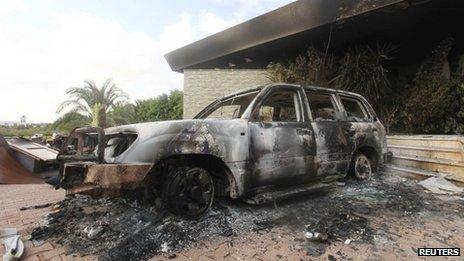Could the Benghazi deaths affect the US elections?
- Published

WASHINGTON: The killing of ambassador Christopher Stevens and three other US staff in Libya has caused considerable shock here.
Whatever the strength of anti-Americanism in certain parts of the world, it is actually highly unusual for an ambassador to be attacked physically and these events stir deep feelings of anger as well as incomprehension.
News channels have been showing the US flag being torn down in Cairo, and the burnout remnants of the consulate in Benghazi where the ambassador to Libya perished.
While foreign policy has yet to play much of a part in the presidential elections, President Obama's critics have been quick to set incidents in Egypt and Libya over the past couple of days into a context of weakness and excessive deference to people who despise America.
A statement issued by the US embassy in Cairo yesterday condemning an anti-Islamic film polemic that has triggered the violent protests, caused a presenter on Fox News to thunder this morning that whoever drafted such a statement "should be sacked".
Last night, before news of the deaths in Libya broke, Fox News ran clips of the president's June 2009 speech at Al Azhar University in Cairo (widely seen as a conciliatory message towards Muslims) during a studio discussion about whether Mr Obama had been too weak in his dealings with Middle East extremists.
Reacting to the news overnight, the president today condemned "the outrageous attack", adding that security would be increased at diplomatic posts worldwide.
Hillary Clinton, the US Secretary of State, today struck a different tone to the Cairo embassy's one of yesterday, noting that religious incitement could never be used to justify violence.
Since Egypt and Libya have often been held up by the administration as successful examples of democratic transition in the Middle East, the incidents may well compound the feelings of incomprehension that many Americans have about the Arab world and Islam.
Like the Danish cartoon row or the protests that followed the burning of Korans at a US base in Afghanistan, these events in north Africa are the product of a perceived insult to the faith, rather than an act of physical violence by some American.
Trailers for the film, made by Egyptian Coptic Christians living in the US, have been posted on Youtube, but few if any of the protesters can have seen the entire thing.
Might the deaths in Libya impact the presidential elections?
It is clear that perceptions of President Obama as somebody who "goes around apologising" for America or kowtowing to Arab leaders (a photo of the president bowing to the king of Saudi Arabia has featured in some of the attack adverts paid for by his critics) do play a part in politics here.
The Republican candidate Mitt Romney has attacked that US Cairo embassy statement made yesterday as, "disgraceful", and "akin to an apology".
With the two campaigns trading recriminations about politicising Ambassador Stevens' death, it is apparent that events in the Middle East have now become part of the campaign.
However, as Mr Romney has already discovered, criticism of the president's record does not necessarily equate to support for the Republican challenge.
This has been particularly true on questions about handling of the economy, the area that is generally regarded as central to the 2012 campaign.
Mr Romney has often portrayed the president as weak internationally and has linked one of the central policies of his Republican campaign - the quest for energy independence - to the desire to avoid being in hock to, "people who don't like us".
The attacks in Libya and Egypt may, however, create some pressure for the president to talk or even act tough. This might produce a stronger line on Iran's nuclear programme, for example - another area where he is currently under attack from the right for being too conciliatory.
- Published12 September 2012
